Discovering Metsovo’s Timeless Spirit
At any time of year –...

© Perikles Merakos
On weekdays, it’s an icy mountain town on the slopes of Mt Parnassos. Red-cheeked shopkeepers bundled in jackets and scarves jump up and down behind their counters to stay warm. On the weekends, things change. The town shines, the visitors pour in, and the store mannequins in the shop windows are only barely as well dressed as the people on the sidewalks of the crowded narrow streets. No one really feels the cold on the weekend.
Arachova is beautiful, not so much because of the architecture – the old mansions and village houses have been replaced by new-builds largely lacking in aesthetic value or a sense of common style – but because of where it stands, amphitheatrically laid out, on the southern slopes of Mt Parnassos, overlooking the Kirfi mountain range.
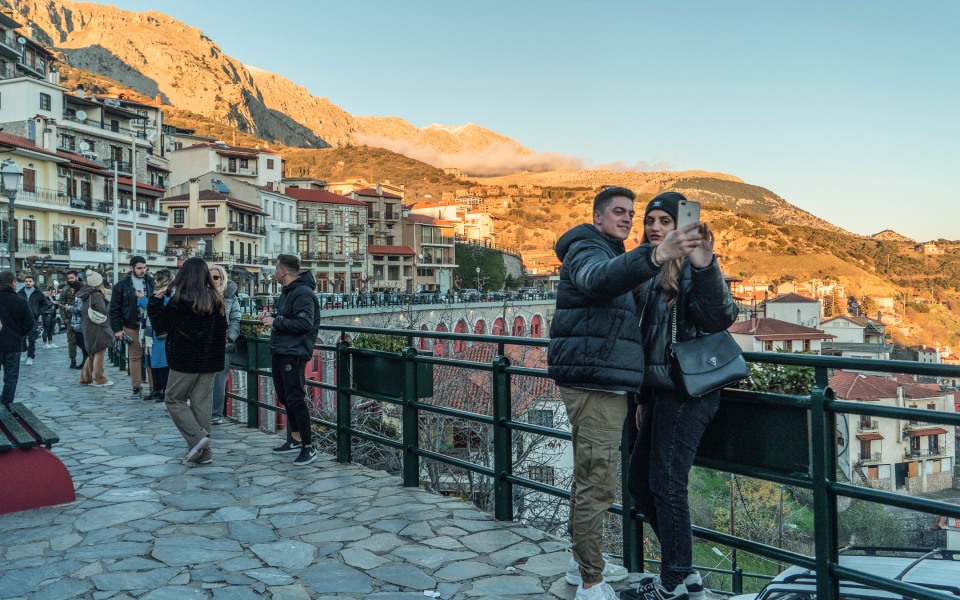
Taking "ussies" with Arachova as the perfect backdrop.
© Perikles Merakos
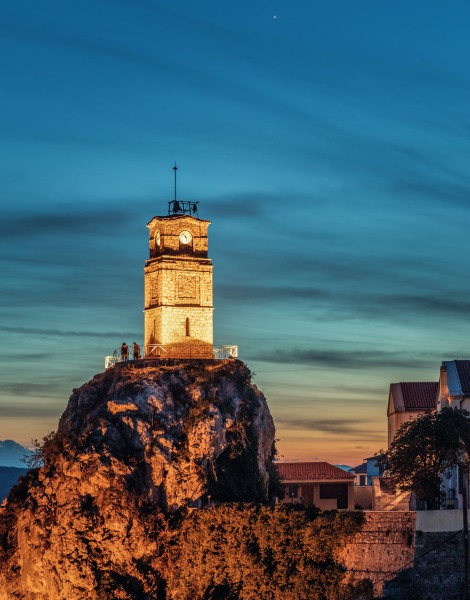
The rock formation with the clock tower, an Arachova landmark.
© Perikles Merakos
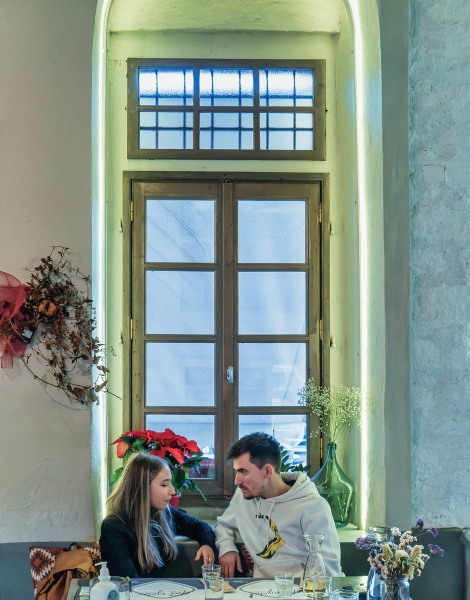
At the Zampas café for tsipouro, mead and snacks.
© Perikles Merakos
Its most distinctive landmarks are a rock formation jutting skyward crowned by a clock tower and a steep set of stairs, the Engarsios, which terminates at the Church of Agios Georgios. The ascent looks daunting, but it’s worth it, if only for the view that one has from the top. The main artery of the town is Delfon Street, where you’ll find most of the shops, and where buses and countless cars pass by, drivers glancing right and left desperately for parking space. Everyone from couples to friends to families with babies in strollers are here, too, on a street that somehow succeeds in accommodating them all, even though it was certainly designed for such a crowd.
The comparative advantage of Arachova in relation to most winter destinations in mainland Greece is its many shops and eateries, many of which excel at the service they provide. The diversity is astonishing; one is known for its specialty coffees, another for its fusion cuisine, and yet another for its beef with noodles or its handmade pickles.
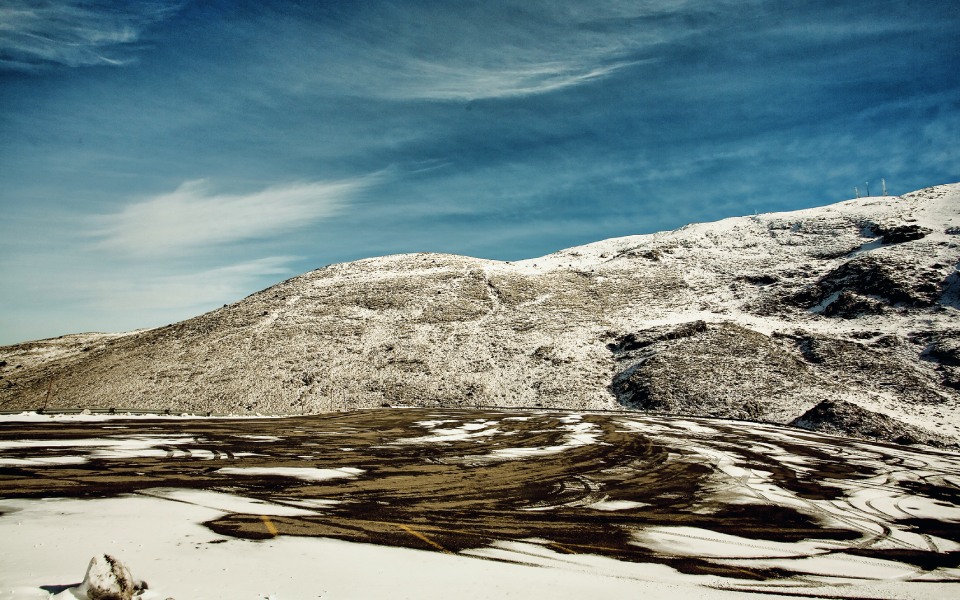
Parnassos, Arachova's greatest attraction.
© Perikles Merakos
Within half a minute you can travel from London to the heart of Central Greece, and from a store that could be located in any metropolis of the Western world, because it’s clearly a faithful follower of the philosophies, decor styles and culinary trends promoted by magazines and Instagram worldwide, to a classic Greek taverna, whose menu we know by heart even before reading it.
Due to its proximity to both the archaeological site of Delphi and the Parnassos Ski Center, Arachova boarded the winter tourism train early, attracting both skiers and archaeologists. Over time, however, it gained its own audience, becoming autonomous in a sense. For a while it overdid it, trading charm for popularity, but eventually it quieted down and redefined its identity. Today, it seems to be experiencing a more mature period; a very large percentage of its entrepreneurs are now locals, from the town or the immediate area. Ask them whether Arachova is a winter version of Mykonos, and they’ll laugh, because none of them agree with this common comparison. Open and relaxed, they know how to give weekend travelers that come here the two days of luxury they seek, without striving for the levels of Mykonos, because they don’t feel the need to.
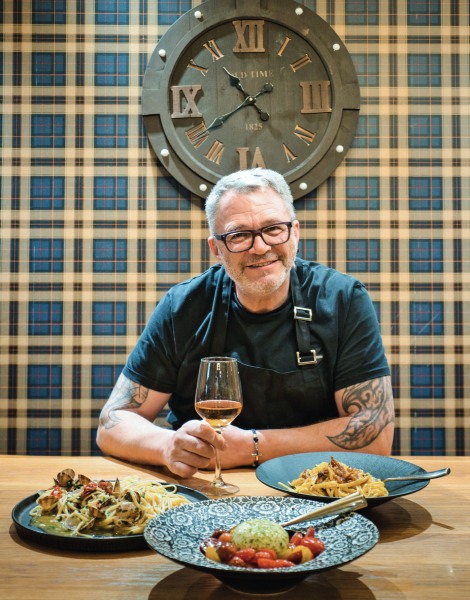
Tavola
© Perikles Merakos
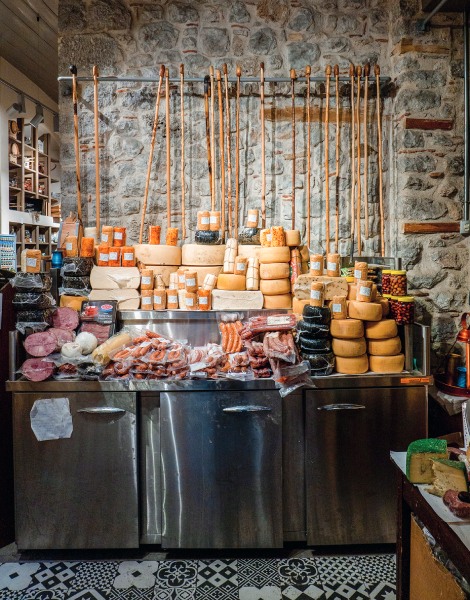
The traditional products of Nikos Syros
© Perikles Merakos
The selection of excellent places to eat and drink in Arachova is outstanding again this year. Here are some of our tried and true suggestions.
FOR TEA AND COFFEE: The O Tea Pineis (Tel. (+30) 22670.316.06), run by the Greek-Russian Athena Bomboli, is one of Arachova’s treasures, with a shop selling herbal teas on the ground floor and a café upstairs. Climb the stairs for a mini tea seminar, with tea served Russian-style: from a samovar, into porcelain mugs. The Sehre Café (Tel. (+30) 22670.315.18), young and stylish, is ideal for brunch. In a nice touch, they sell bottled cold brew coffee to go, for the ski crowd.
FOR MEZES AND TRADITIONAL DISHES: At the café Zampas (Tel. (+30) 22670.310.48), they serve snacks, eggs (sunny-side up, with cayenne, with tomato, and with kavourma), savory pies, cheeses, and their own pickled items and pastries. At the taverna Kaplanis (Tel. (+30) 22670.318.91), you can enjoy hot soups, meat dishes, delicious gardoumbakia (offal roll) and their own wine, while at Fterolakka (Tel. (+30) 22670.311.04), you’ll find the menu on the label of the wine bottles; it features stewed and grilled dishes, an awesome salad of beetroot, sour apple, walnut and yogurt sauce, and the local brand of tsipouro, a strong spirit, called Vasilia. At Panagiota (Tel. (+30) 22670.32933), an eatery with a long history of serving prominent personalities, as can be seen from the thank-you notes on the wall, the food can be described as a modern take on “homemade.” The spicy cheese is particularly noteworthy, both for its presentation and the flavors it delivers.
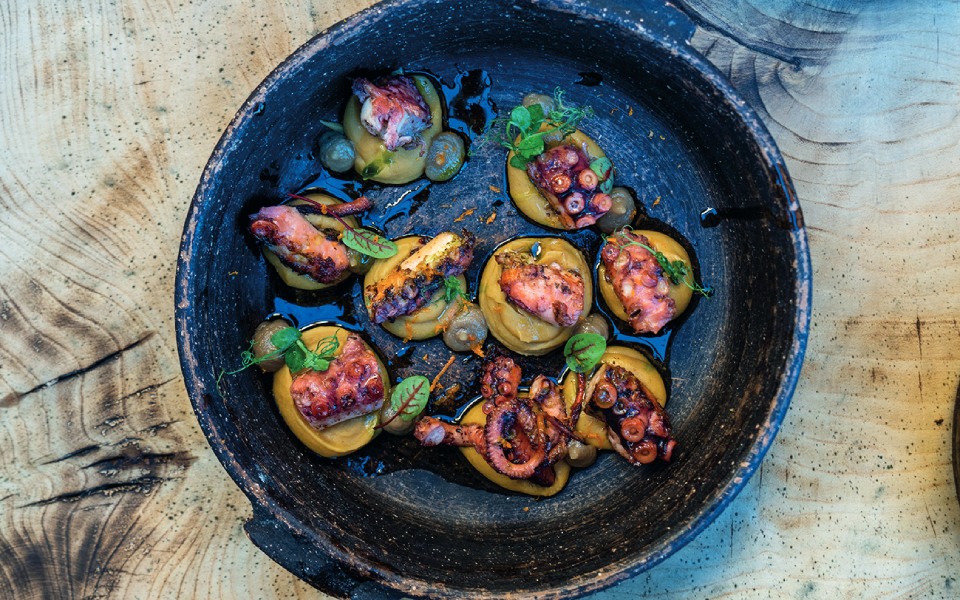
Carefully prepared dishes at Skala Up For Food.
© Perikles Merakos

Whiskey for two in the establishment called Room.
© Perikles Merakos
FOR NEW GREEK DISHES AND ITALIAN CUISINE: At E Bar-Restaurant (Tel. (+30) 22670.311.58), with its polite staff and a large patio whose glass doors fill the space with light, you can try all kinds of dishes, both Greek and foreign (including pancakes, grilled sandwihes, pumpkin soufflé, and ragout beef with noodles). At Barile Resto Vino Bar (Tel. (+30) 22670.310.07), they honor the philosophy of fusion cuisine with exceptional bao buns, spetsofai (sausages and peppers) and spring rolls made with stewed wild boar. Skala Up For Food (Tel. (+30) 22670.329.48) is also very good; it has a carefully constructed menu of attractively presented dishes, including innovative Greek ones (chickpeas with shrimp, pumpkin and fresh truffle, and rooster with fermented cracked wheat, salami, clarified sheep’s butter and thyme). Tavola (Tel. (+30) 697.343.1969), run by Loukas Syros, is a romantically lit treat for those who love Italian cuisine classics such as risotto and pasta.
FOR STREET FOOD AND GOOD WHISKEY: If you’re craving pizza, head for Pomodori (Tel. (+30) 22670.310.23). If you want a quick and delicious meat skewer wrapped in pita, try Lois (Tel. (+30) 22670.328.48). Definitely worth a visit is Room (Tel. (+30) 693.273.6033), a bar for cocktails and good whisky, with an air of Berlin about its music and notes of London for its stylish decor. A new arrival in town is the Yuki Mountain Bar (Tel. (+30) 22670.291.58), a sushi bar and more which opened in the middle of last December. It’s a nightclub with mainstream music and which, in addition to sushi, serves premium drinks and cocktails with Asian twists (such as Sake Martini).
N.B. Most shops in Arachova operate on an all-day basis; they open in the morning and serve coffee, food and drink throughout the day.
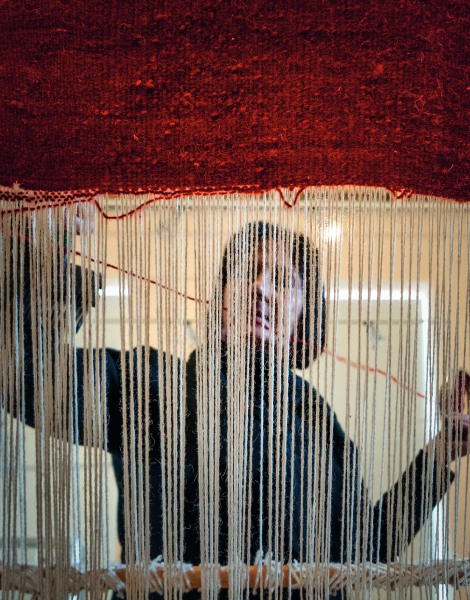
© Perikles Merakos
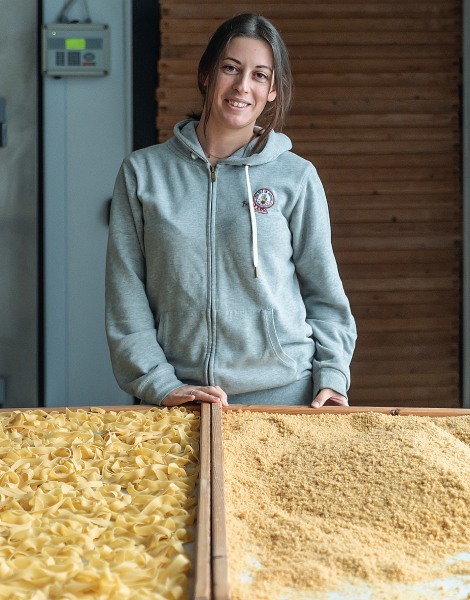
© Perikles Merakos
Not only tourism: Arachova has many residents with a love for tradition and a passion for creation.
In 1927, when the first Delphic Festival was held, Eva Palmer-Sikelianou designed and made costumes for a production of Aeschylus’ Prometheus Bound, using Arachovite fabrics, and the folklorist Angeliki Hatzimichali curated a great exhibition of folk art in Arachova. This was the year that brought Arachovite textiles to the attention of a much wider audience. Almost a century later, few local women know how to work the loom. One of them is Dimitra Taxiarchi, who was born in Davlia and came to Arachova at a very young age. She started weaving at the age of 12, learning to make sheets, tablecloths and rugs. Today, she continues to do so, but as a teacher, part of a weaving workshop organized by the Folklore Museum (Tel. (+30) 22670.316.30, open 11:00-18:00 except Mon and Tue, free entrance). “First we made our dowries and then we went to work,” she says, noting that the income from weaving supplemented the family budget. The younger generations did not take up weaving, and the result was that the art was, for a long time, largely forgotten, a fact that Taxiarchi laments. Hand-woven fabric is, she says, unique: “Its value is indescribable.”
Today, women and men are once again interested in learning to weave, although no longer out of economic necessity. The Folklore Museum of Arachova contributes in various ways to boosting the popularity of textile-making, and keeps different types of looms on display, including a common loom, an outdoor loom, an upright loom and a Penelope loom.
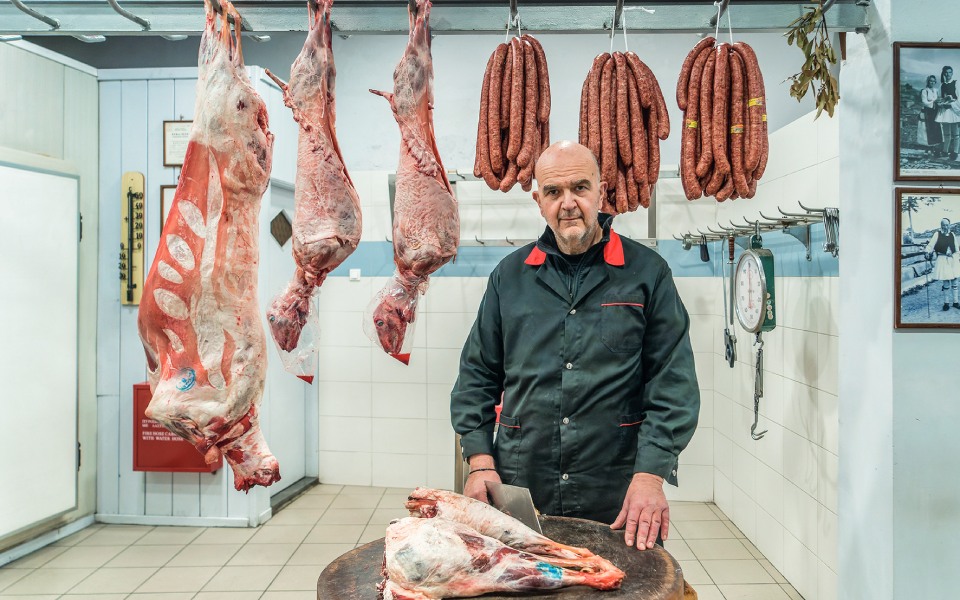
In Kostas Kommatas' butcher shop.
© Perikles Merakos
Arachova is famous for its local products, and it’s good to see that the younger generations have carried on production in a number of sectors. Two who are doing so are Nicoleta and Anastasia Vassilia, who joined the family business and are now helping to bring attention to it. The two sisters maintain a small but fully equipped facility in Livadi (the satellite settlement of Arachova) for the production of noodles, white trachana (a sour or sweet fermented mixture of yogurt and wheat – this one is made with thick semolina), and traditional Arachova trachana, from bulgur. this last item won first prize at Expotrof, the Greek Fine Food Exposition, in 2019, for the traditional way in which it’s made. You’ll find their products in artisanal stores, butchers, supermarkets and mini markets in Arachova, Livadia, Itea, Amfissa, and Athens. Tel. (+30) 22670.220.50, [email protected].
One of the few shepherds left in the area, Giannis Raptis earns his living in Toumbri, just outside Arachova. “The old generation is gone, there are five or six 60-something-year-olds left and as many as that who are 40 years old and over.” Raptis’ profession is of symbolic importance for the area, which has a long history of sheepherding, but under the present circumstances the work does not seem to be profitable enough to attract new people. What’s more, the cold and the mountainous terrain of Arachova makes it difficult to source food for the animals locally.
Raptis is also involved in cheese-making – he produces formaela (on average two tons per year) and obsimotyri (a local spreadable cheese). He treats his animals, “a hundred sheep, local stock improved with other breeds,” a bit like his children. He finds it difficult to slaughter them, although that is part of his job. After forty years in the profession, the herd isn’t just a means to make money but part of his life.
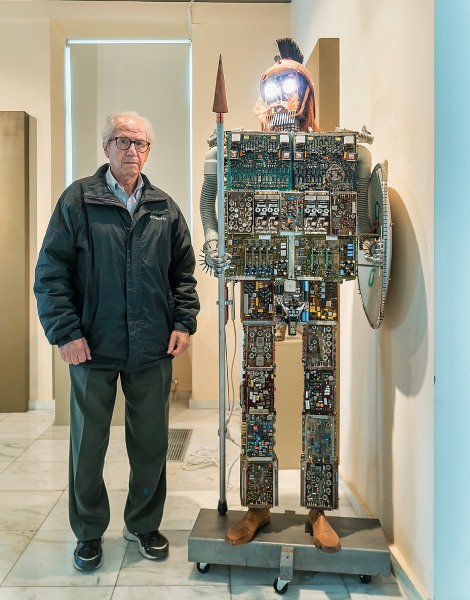
© Perikles Merakos
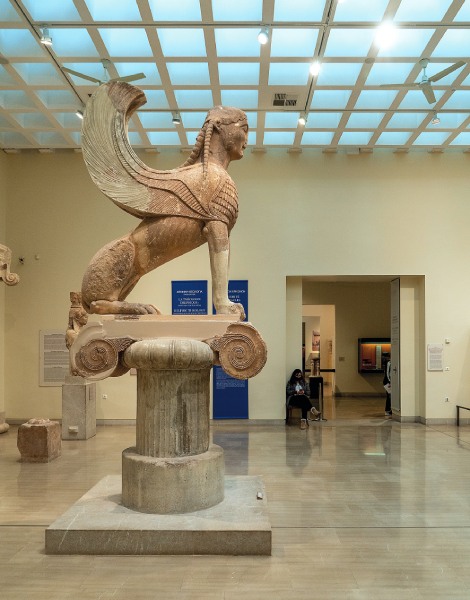
The Archaeological Museum of Delphi.
© Perikles Merakos
Born and raised in Arachova, Takis Mylonas set off for high school in Piraeus in 1949. “Then, after I finished school, I took a job at OTE (the National Telephone Company) as a technician, helping to build telephone exchanges. We set them up in Athens and in the provinces.” What can a telephone technician be hiding in his heart? Perhaps an artist with an inexhaustible imagination. When the transition to the digital age took place, Mylonas rescued some parts from old analog machines that were slated for recycling. First, he made a watch. “From then on, my appetite was whetted,” he said, as a result of which he created dozens of figures using obsolete equipment as raw material. A telephone operator, a skier, two motorcyclists and a knight are just some of the characters in his collection of spectacular robot-people, part of which is in the Folklore Museum of Arachova. One of those kind souls who also boasts a bright mind, Mylonas has contributed to the preservation of local history with his book “Arachova: Images and Memories of Yesterday” (you’ll find this, too, in the Folklore Museum).
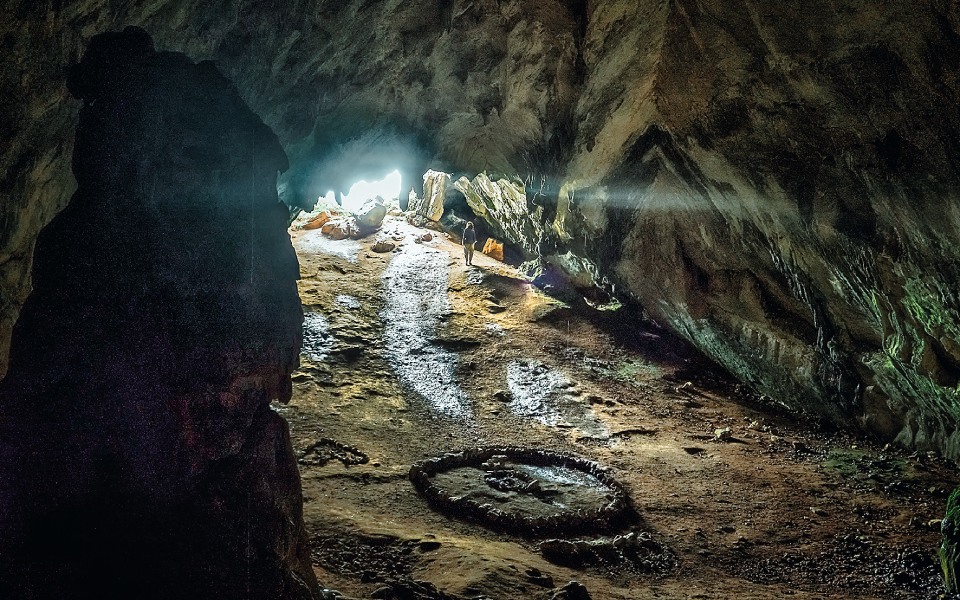
The Korykeio Cave.
© Perikles Merakos
On the way to Arachova, the Monastery of Osios Loukas (Tel. (+30) 22670.213.05, daily 08:30-15:30) stands in an imposing spot on the slopes of Elikonas (25 km/30 minutes from Arachova). It is a UNESCO-listed site famous for its mosaics. In addition to the structure itself, the exhibition inside is also intriguing, with information about the history, the architecture, and the social conditions that influenced the monasteries of the mid-Byzantine era.
Another excursion you might want to take is a trip to the archaeological site of Delphi (12 km/15 minutes from Arachova), not just for the mythology that surrounds the sanctuary, the stories about the Oracle and its ambiguous advice that we remember from childhood story, but for the energizing atmosphere of the place, which often manages to move even the most skeptical of visitors. The remains of the Temple of Apollo, the stadium and the ancient theater compose perhaps the most beautiful archaeological site in Greece. Close by is the Archaeological Museum of Delphi (Tel. (+30) 22670.823.12, daily 08:30-15:30, single ticket 6 euros), with its exhibits complementing each other to understand the importance of Delphi in antiquity.
The Korykeio Cave (17 km/30 minutes from Arachova) is also nearby. You can reach this deep cave, with its stalactites, via a short ride through a dense fir forest, but note that the road becomes rugged over the last 3.5 kilometers. Wear suitable shoes, because the ground inside and outside the cave is slippery underfoot.
The Parnassos Ski Center (27 km/40 minutes from Arachova), operational for 46 years, was racking up annual visitor figures of between 110,000 and 130,000 before Covid-19. It has 23 slopes, 17 lifts, 34 kilometers of ski slopes, 12 black trails, ski schools and equipment rental shops. Of the four ski lodges (in Kelaria, Fterolakka and Vakko), the one in Fterolakka and the two in Kelaria were recently renovated, a fact that makes the destination even more inviting, since the lodges have their own loyal patrons, not all of whom ski. Always equip yourself with chains when heading up to Parnassos and remain informed of weather conditions by checking with meteorological sites and the social media pages of the ski resort. Tel. (+30) 22670.227.00, parnassos-ski.gr
Travel Note: Arachova is 170 km/2 hours from Athens and 370 km/4.5 hours from Thessaloniki. Estimated cost is €28 one-way from Athens and €64 one-way from Thessaloniki, including fuel and tolls.
ACCOMMODATION OPTIONS
Aigli (Tel. (+30) 22670.317.67). Since its opening in 2008, it has become a popular choice among visitors. It has 36 rooms, spa services (massage, swimming pool, Turkish bath, sauna, and whirlpool), and it’s been built to look like a miniature version of the town of Arachova. A sumptious breakfast is served in the fourth-floor restaurant. From €95 per double.
Afanos (Tel. (+30) 22670.315.14). The guesthouse occupies an old mansion; it has 12 rooms and two suites. Choose doubles room without a fireplace, double rooms with a fireplace or either of the two suites. Breakfast includes artisanal bread, fresh croissants, fruit, eggs, juice, yoghurt, and honey, and can be served in bed. From €90 per double.
Blue Mountain (Tel. (+30) 694.907.0904). Opened in 2019, this establishment has three double rooms (one with a jacuzzi) and two five-bed rooms. It offers a continental breakfast (bread, butter, jam, cheese, and cake) and is suitable for couples and families with children. The rooms have Nespresso machines, Netflix, board games (Monopoly, Uno, Scrabble), and children’s books. From €80 per double.
Peony (Tel. (+30) 22670.321.77). A guesthouse with 14 rooms (standard doubles, deluxe doubles and triples), this establishment offers a full breakfast (eggs, cereal, croissants, coffee, and fresh juices), and there’s a ski equipment storage room that serves those guests who will be skiing on Mt Parnassos. The guesthouse’s name comes from a local mountain wildflower, Paeonia parnassica. From €100 per double.
Santa Marina Arachova Resort & Spa (Tel. (+30) 22670.319.54). The resort provides luxurious accommodation with suites and a villa, an indoor pool with spa jets, a gym and rooms for face and body treatments. Breakfast here includes eggs (poached, scrambled or omelettes), savory pies, fresh juices, rice pudding, and cake. Please note that the establishment operates on Fridays and Saturdays only, with Sunday departures required. From €240 per double.
MARKETS
In the butcher shop of Kostas Kommatas (Tel. (+30) 22670.311.94) you’ll find cheese as well as sausages and well as many other fine meats, and the proprietor will also be happy to answer questions about the town. There are several shops with traditional products, such as Nikos Syros (Tel. (+30) 22670.326.85), which has Arachova olive oil, Amfissa olives, trachana, noodles and local cheeses, such as Arachova’s own PDO formaela. The Papastathis store (Tel. (+30) 22670.291.82) is perfect if you have a sweet tooth; they have special local cookies and other treats made with coconuts and almonds, as well as “cigars,” elongated syrup-soaked sweets.
TIPS
WEATHER: On the webpage arahovameteo.gr, you’ll find weather data for Arachova and information on the katevatos, a northeast wind that descends from the peaks of Parnassos. In addition to its very real effects on the environment, the katevatos has fostered a number of local legends.
ARTS: Four years ago, the theater and dance group Urbandig Project, in collaboration with the University of Patras and the European Cultural Center of Delphi, conducted research into the textile traditions of Arachova. In 2021, they used what they’d found to make a video, shot at the Folklore Museum, showing lesser-known aspects of the daily life of Arachova weavers who, when they took breaks from the loom, danced for relaxation. The aim is to organize future trips to Arachova with a focus on textiles and the activities presented in the video (you can watch it at urbandigproject.org). The video shoot took place in collaboration with the Folklore Museum of Arachova and with the support of the Ministry of Culture and Sports.
At any time of year –...
Whether you’re in northern, central or...
A steep and curvy drive high...
Biology, flavor and local stories all...